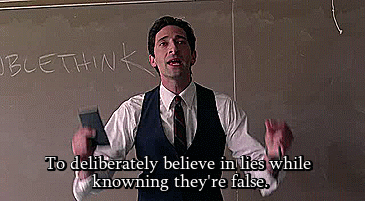Adrien Brody delivers an amazing
performance as a substitute teacher that lives detached from people. He teaches
inner city student, while dealing with a dying grandfather troubled by his
past, and takes an underage prostitute off the streets and into his home. “Detachment”
depicts the serious issues facing public schools, including staff and students,
correlated with the amount of help received from the government. Director Tony
Kaye reminds us that “No Child Left Behind” is bullshit, and which main concern
is property value. The film narrates how unappreciated teachers are in the
United States, the result of the lack of good parenting skills, and the
external factors affecting the public education system.
The film opens with real teachers
describing how they fell into, or were inspired to be a teacher. As the stories
progress, you soon understand that some of these people didn’t intend to be
full time teachers, they had other plans, but the fallacy of comfort trapped
them in. The movie follows a substitute teacher, who tends to live detached
from people, throughout his encounters with students facing different problems.
One student seems infatuated with hurting animals, another suffers from verbal
harassment brought on by her parents, and so on. “Detachment” also explores how
a teen may fall into prostitution just to survive, and asks, how long can she
keep getting used before she just becomes a walking body?
The film comments on how the youth in
America is under a marketing holocaust, limiting their mind’s capacity, pushing
them towards an abyss of ignorance. James Caan interprets a teacher that pops
pills and is not afraid of mocking narcissistic, empty-headed, problematic teenagers.
One student comes in with a tiny top claiming to not be giving it up to “every
dick in my face,” he showers her with pictures of gonorrhea infested vaginas. He
humiliates another student by repeating what the kid said in opera form, and
the list goes on. Without giving much away, throughout the movie, you
understand how unappreciated teachers are in America, and how a simple, “Thank
you,” can make a difference.
Tony Kaye includes how the “No Child Left
Behind” act’s only concern is raising property value through higher test
scores. During a faculty meeting, a “No Child Left Behind” representative treats
these educators more as real estate agents than teachers. The story exemplifies
the result of lack of parental involvement in their children’s education,
especially in inner city kids. The empty and silent hallways of this urban
school on Parent Teacher night says more than a thousand word monologue.
Finally,
this film is an actual work of art; it’s a perfect reflection of our dangerous
reality. The cast did a great job of bringing life to these troubled characters;
the young cast did amazing, and the actors that portrayed the school faculty
gave a soul to this film. Check out the trailer down below, and if you still
don’t feel like watching it, watch it either way and tell me what you think!







